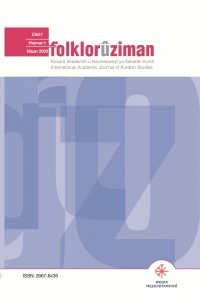IDENTITY PERCEPTIONS OF ALEVI AND EZIDI KURDS IN THE CONTEXT OF FOLK NARRATIVES
IDENTITY PERCEPTIONS OF ALEVI AND EZIDI KURDS IN THE CONTEXT OF FOLK NARRATIVES
___
- Aksoy, G. (2006). Dersim Alevi Kürt mitolojisi, İstanbul: Komal.
- Allison, C. (2007). Yezidi sözlü kültürü, (çev. Fahriye Adsay), İstanbul: Avesta.
- Bates, D. G. (2009). 21. yüzyılda kültürel antropoloji, (çev. Süavi Aydın), İstanbul: İstanbul Bilgi Üniversitesi.
- Bruinessen, M. V. (2002). Kürdistan üzerine yazılar, (çev. , Nevzat Kıraç), İstanbul: İletişim.
- Celîl, C. &Şadkam, G. (2012). Sêxiştiyên kurmancî, Wien: Înstîtuya Kurdzaniyê-Wien.
- Cengiz, D. (2010). Dizeleriyle tarihe tanık Dersim Şairi Sey Qaji, İstanbul: Horasan.
- Düzgün, M. (1992). Tayê lawikê Dêrsimî, Ankara: Berhem.
- Farqînî, Î (2011). Bi zarê êzîdîyan çîrokên gelêrî (Ji deverên Xankê û Baedrê), İstanbul: J&J
- Eriksen, T. H. (2004). Etnisite ve milliyetçilik, antropolojik bir bakış, (çev. Ekin Uşaklı), İstanbul: Avesta.
- Hobsbawm, E. J. (2017). Milletler ve milliyetçilik, Ayrıntı Yayınları, (çev. Osman Akınhay), İstanbul: Ayrıntı.
- Izady, M. R. (2013). Kürtler, Doz Yayınları, (çev. Cemal Atilla), İstanbul: Doz.
- Kreyenbroek, P. G. &Reşow, X. C. (2011), Tanrı ve Şeyh Adi kusursuzdur, (çev. İbrahim Bingöl), 1. Baskı, İstanbul: Avesta.
- Oğuz, M. Ö. &Baki, Z. S. &Tekin, G. (Ed. ), (2014). Halk biliminde kuramlar ve yaklaşımlar IV, Ankara: Geleneksel.
- Celîl, C. &Celîl, O. (2003). Zargotina kurda, Amed: Aram
- Pertev, R. (2018). Folklor û nasnameya kurdî ya neteweyî, Stenbol: Avesta.
- Smith, A. D. (2002). Ulusların etnik kökeni, (çev. Sonay Bayramoğlu&Hülya Kendir), Ankara: Dost.
- Stern, S. (2014). ‘Etnik folklor ve etnisite folklorü’, (çev. Başak Çalışkan), Halk biliminde kuramlar ve yaklaşımlar IV, Ankara: Geleneksel.
- Şengalî, X. (2011). Li Çiyayê Şengalê qebqeba kewê nêre (Bergî Yekem), Duhok: Enstîtuya Kelepûrên Kurdî.
- Bedlîsî, Ş. (2007), Şerefname, (çev. Ziya Avcı), Stenbol: Avesta.
- Uluçay, Ö. (2012). Destana Dewrêşê Evdî (tehlîl-tesnîf-kilam), Stenbol: Dîwan.
- Vali, A. (2005). Kürt milliyetçiliğinin kökenleri, (çev. Fahriye Adsay&Ümit Aydoğmuş&Sema Kılıç), İstanbul: Avesta.
- ISSN: 2667-6435
- Başlangıç: 2020
- Yayıncı: Mezopotamya Eğitim Bilim Sanat Sağlık Ve Kültür Vakfı İktisadi İşletmesi
THE ORIGIN OF LANGUAGE: AN INTRODUCTION
ANIMAL NAMES AND SPECIES AND LIVESTOCK CULTURE IN THE KARAJDAKH REGION OF WERANSHAR
HOMOSEXUAL THEMES AND QUEER CHARACTERS IN THE MEMÊ ALAN EPIC
THE ORDER OF POSTADJUNCTS IN NOUN PHRASES IN BEHDINI KURDISH
COREFERENTIALITY IN THE COMPLEX CLAUSES
A PHONOLOGICAL COMPARISON OF KHORASAN AND NORTHERN KURMANJI
“CONJUGATION OF KURDISH VERBS” OF MELA MAHMUDI BAZIDI
ASPECT AND GRAMMATICAL FORM OF STATES IN KURMANJI
IDENTITY PERCEPTIONS OF ALEVI AND EZIDI KURDS IN THE CONTEXT OF FOLK NARRATIVES
